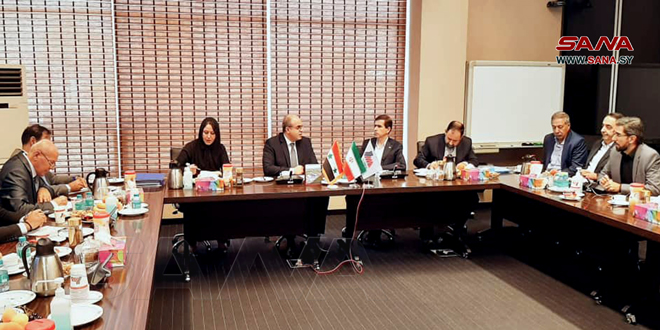Al-Khalil holds meetings with Iranian officials on cooperation in the field of agriculture, electricity and investment
The Syrian delegation, currently visiting Iran, resumed on Tuesday its meetings to follow up on the implementation of the agreements and understandings reached during the recent visit of the Iranian president Ebrahim Raesi to Syria.
After the meeting that was held at the Ministry of Roads and Cities Construction, The Syrian Minister of Economy and Foreign Trade Muhammad Samer Al-Khalil, head of the Syrian delegation, held a meeting with the Iranian Minister of Agriculture Muhammad Ali Nikbakht, during which ways to develop the exchange of agricultural products and cooperation to establish some projects that would raise the yield of agricultural production in Syria were discussed.
Nikbakht talked about ways to benefit from the results of the research works conducted by the scientific institutions of the Ministry of Agriculture in Iran to serve the agricultural sector in Syria.
Al-Khalil also met with the Iranian Minister of Economy and Finance Ihsan Khandozi during which the two sides discussed the measures that must be taken to complete the establishment of the joint bank and the insurance company. They emphasized the importance of the rapid steps that were taken in this regard in addition to other mechanisms that would overcome difficulties related to remittances, thus contributing to the development of economic cooperation and the promotion of trade exchange.
The ministers also discussed implementing some investment projects in Syria through the Iranian Foreign Investment Company, in addition to cooperation in electronically exchanging information and customs data, as well as exchanging experiences in tax and customs legislations.
Later, Al-Khalil met with Iranian Oil Minister Javad Oji and the two sides reviewed the existing cooperation relations between the two countries in the field of oil and the possibility of boosting these relations.
Al-Khalil also held meetings with major Iranian economic groups wishing to carry out investments in Syria during the reconstruction stage in many fields, especially infrastructure, industry and housing.
Given the priority of the issue of providing electric power necessary for citizens and for continuing and expanding the production process, a meeting was held with the administration of the Iranian “Mabna Group” which has implemented some electricity projects in Syria.
The current situation was assessed and new investment formulas were discussed in terms of cooperation in the next phase to implement some important vital projects with reference to the importance of the proposed contractual formulas that reflect the economic feasibility that will be achieved for both countries in terms of necessary achievement as well as profitability and time.
Hamda Mustafa

